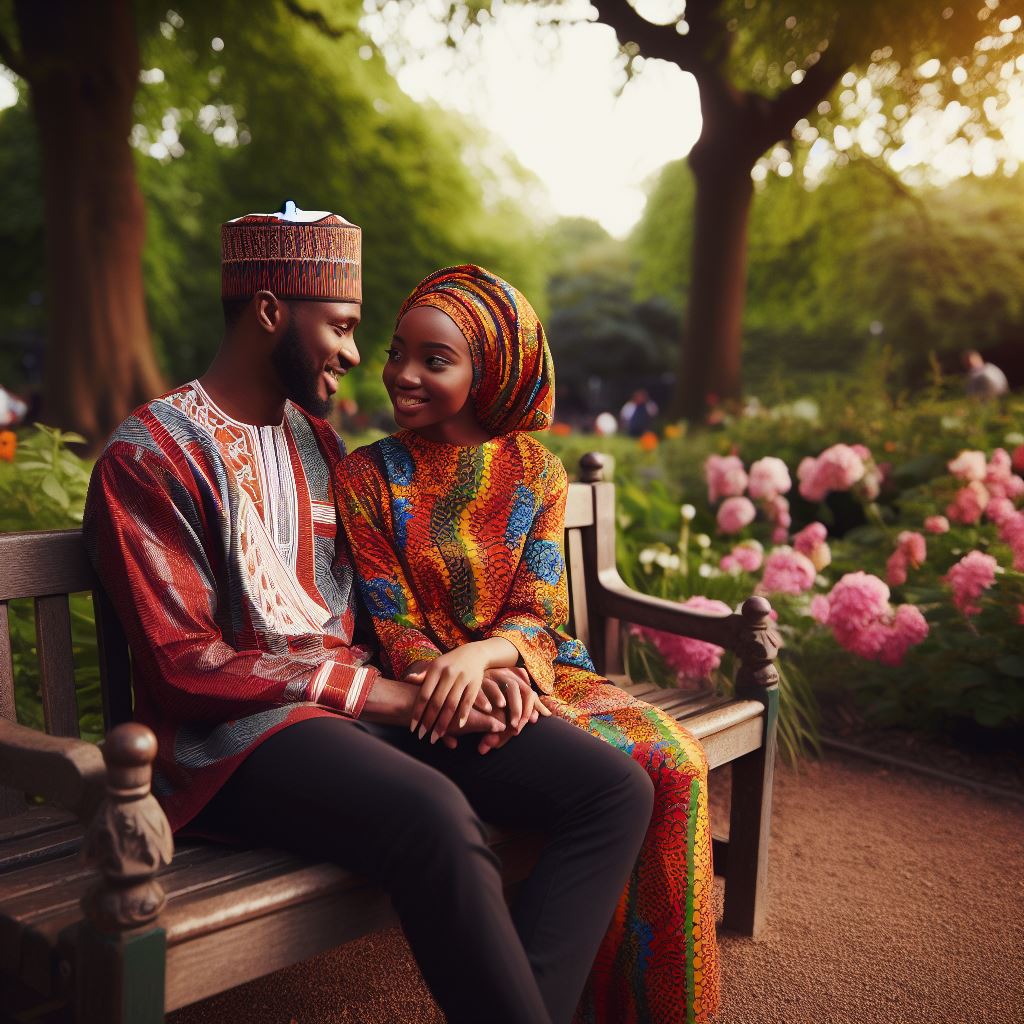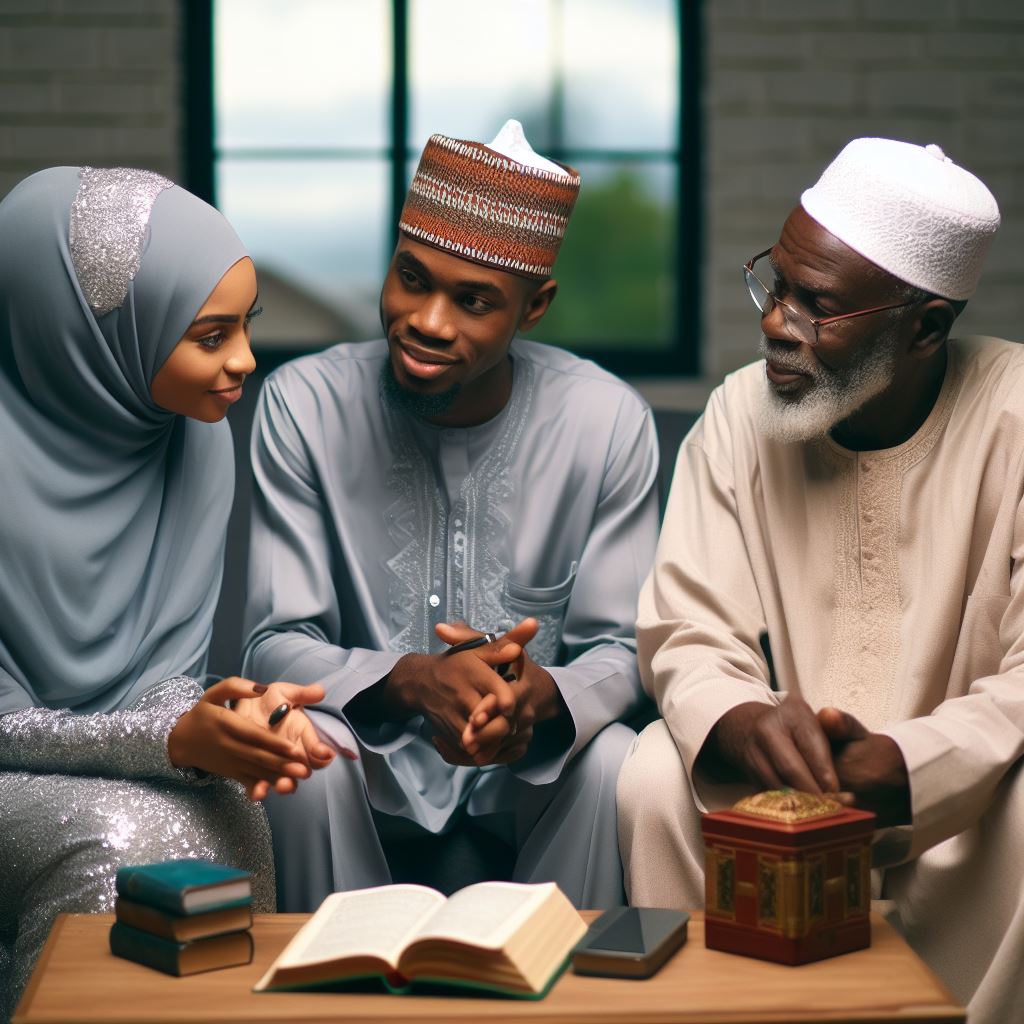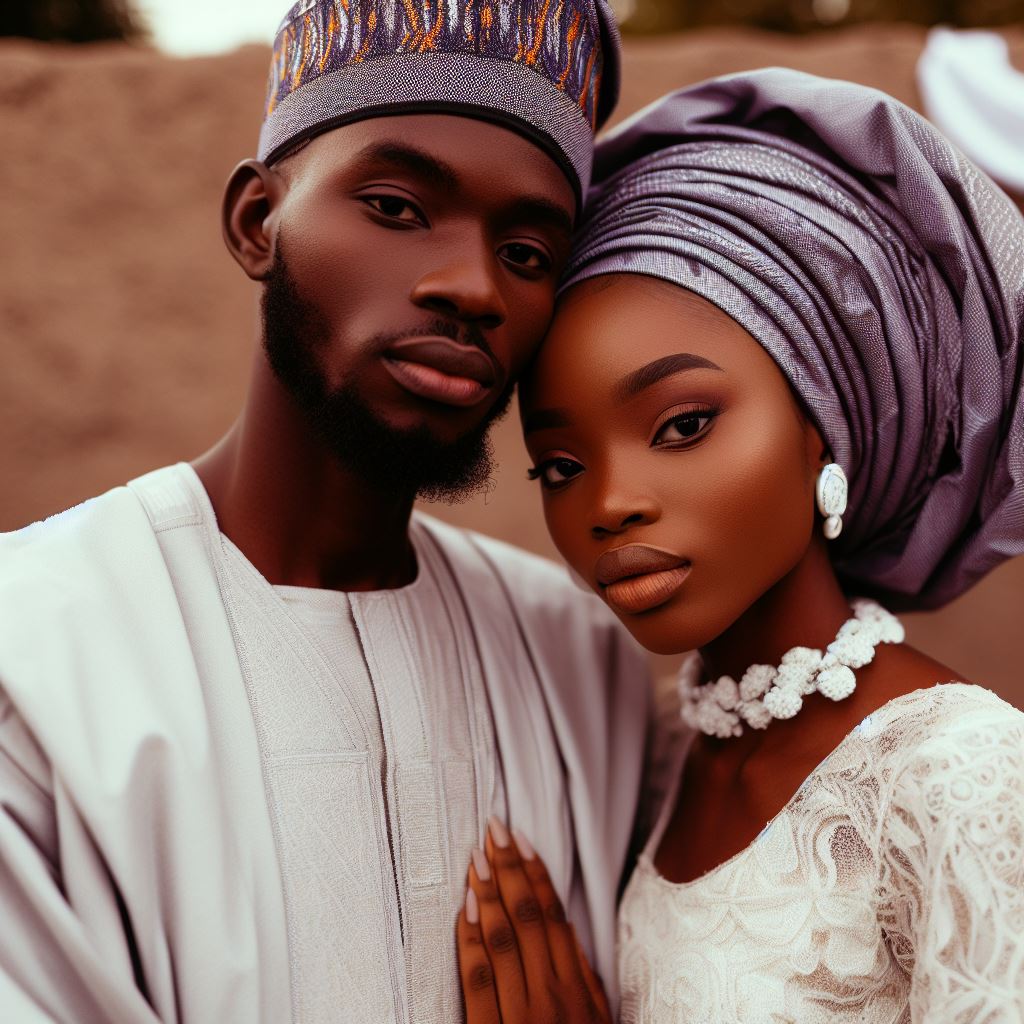Introduction
The Essence of Marriage in Islam is the beautiful institution that unites two souls, allowing them to embark on a sacred journey of love and companionship.
In Islam, this sacred bond is not just based on physical attraction or societal norms but is rooted in the concepts of love and mercy.
Both these elements play a crucial role in establishing strong marital relationships.
Love is the basic building block of any successful marriage. It encompasses affection, care, and genuine concern for one another.
Islam promotes the idea that spouses should love each other unconditionally, supporting and uplifting one another in times of joy and sorrow.
Love fosters understanding, patience, and empathy, making it easier for couples to navigate challenges and conflicts.
Moreover, mercy is another vital aspect that Islam highlights in the context of marriage.
It involves showing kindness, forgiveness, and compassion towards one’s spouse.
Mercy allows couples to forgive each other’s shortcomings, creating an environment of acceptance and understanding.
It promotes a culture of respect and harmony, enabling spouses to grow together and build a strong bond.
Islam considers marriage as a means of finding peace and tranquility.
It encourages couples to nurture love and mercy in their relationship, as they are the essence of a successful marriage.
By incorporating these qualities into their daily lives, spouses can create an environment filled with love, where their hearts are interconnected.
Basically, love and mercy are integral to a fulfilling and lasting marriage in Islam.
These elements provide a solid foundation for a harmonious relationship filled with compassion, kindness, and understanding and it is the essence of marriage in Islam.
Understanding Islam’s perspective on marriage can help couples build and maintain a strong bond, fostering love and mercy throughout their lifetime together.
The Concept of Love in Islam
Understanding love in the Islamic context
- Love in Islam goes beyond mere emotions; it encompasses actions and intentions.
- It is a profound connection that is cultivated through trust, respect, and selflessness.
- Islamic love is rooted in the teachings of the Quran and the example set by Prophet Muhammad (peace be upon him).
- It emphasizes the importance of love towards all creation, including spouses, family, neighbors, and even enemies.
- Love in Islam is not limited to romantic relationships but extends to compassion and kindness in all aspects of life.
Love as a reflection of God’s mercy
- Islam teaches that God is the source of all love and mercy.
- Love between spouses is considered a blessing from God and a means to achieve tranquility and harmony.
- Muslims are encouraged to seek a spouse who will help them grow spiritually and be a source of love and mercy.
- Love within a marriage should be nurtured by constantly showing kindness, forgiveness, and understanding.
- It should be a reflection of God’s love for His creation, as He is the most loving and merciful.
Importance of fostering love in a marital relationship
- Fostering love in a marital relationship is crucial for a successful and fulfilling marriage.
- Love strengthens the bond between spouses and creates a safe and peaceful environment.
- It helps in resolving conflicts and encourages communication and empathy.
- Love is the foundation upon which trust, loyalty, and companionship are built.
- It is through love that spouses find comfort, support, and emotional intimacy.
Generally, love holds a significant place in Islam and is seen as an essential aspect of a successful marital relationship.
It goes beyond mere emotions and is deeply rooted in the teachings of Islam.
Love is seen as a reflection of God’s mercy and is meant to be nurtured through actions and intentions.
Fostering love in a marriage is vital for creating a strong bond between spouses and fostering a peaceful and harmonious environment.
By embodying love, spouses can build a foundation of trust, loyalty, and companionship that enables them to navigate the challenges of married life with compassion and understanding.
Read: Nikah Khutbah: Significance and Common Practices in Nigeria
The Significance of Mercy in Islam
Definition of mercy in Islam
- Mercy, or “rahma” in Arabic, is a fundamental concept in Islamic teachings.
- It is a combination of compassion, love, and forgiveness towards others.
- In Islam, mercy is seen as a divine attribute of Allah.
Allah’s emphasis on mercy in the Quran
- The Quran describes Allah as infinitely merciful and compassionate.
- He is repeatedly referred to as “Ar-Rahman” and “Ar-Rahim,” meaning “The Most Gracious” and “The Most Merciful.”
- Allah’s mercy is all-encompassing, extending to every living being.
- His mercy is not limited to Muslims only; it encompasses all of humanity.
- Islam teaches that Allah’s mercy surpasses His wrath, and His forgiveness is always available to those who seek it.
Mercy as a foundation for a successful marriage
- In Islam, marriage is considered a sacred bond and a means to attain tranquility and companionship.
- Mercy is crucial in maintaining a healthy and harmonious marital relationship.
- Both partners should treat each other with compassion, empathy, and forgiveness.
- Mercy fosters understanding, respect, and appreciation for one another’s strengths and weaknesses.
- It helps create a nurturing environment in which love can flourish.
Practical ways to incorporate mercy into a marriage
- Communicate openly and honestly, expressing love and support for one another.
- Show empathy and understanding during times of disagreement or conflicts.
- Forgive and let go of grudges, seeking reconciliation instead of holding onto resentment.
- Offer acts of kindness and generosity to your spouse, considering their needs and well-being.
- Practice patience and tolerance, accepting each other’s imperfections and working towards personal growth together.
- Seek guidance from the teachings of the Quran and the examples set by the Prophet Muhammad (peace be upon him).
Essentially, mercy is an essential aspect of Islam, and it holds great significance in the context of marriage.
Incorporating mercy into a marital relationship builds a foundation of love, compassion, and forgiveness.
By practicing mercy towards one another, spouses can create a nurturing and fulfilling partnership that lasts a lifetime. This is the essence of marriage in Islam
Read: Choosing a Spouse in Islam: Criteria and Nigerian Context
Love and Mercy within the Islamic Marriage Contract
The notion of Mahr (dowry) as an act of love and mutual respect
In essence of marriage in Islam, the concept of Mahr (dowry) is not merely a financial transaction but an expression of love and mutual respect between the husband and wife.
It symbolizes the husband’s commitment to support his wife financially.
Moreover, the Mahr serves as a form of security for the wife, ensuring that she will be taken care of in case of divorce or any unforeseen circumstances.
It emphasizes the importance of financial equity and stability within the marriage.
Husband-wife relationship based on love and mercy
In Islam, the relationship between a husband and wife is based on love and mercy.
The Quran describes marriage as a bond of affection and compassion, where both spouses find solace and tranquility in each other.
Love and mercy form the cornerstone of a successful marital relationship, fostering understanding, forgiveness, and support.
The husband and wife are encouraged to treat each other with kindness, respect, and empathy.
Mutual rights and responsibilities in marriage
The Essence of Marriage in Islam entails a set of mutual rights and responsibilities for both spouses.
The husband is responsible for providing financial support and maintaining the family’s wellbeing, while the wife has the right to be treated with dignity and respect.
Both husband and wife have the right to express their opinions, participate in decision-making, and pursue personal growth within the bounds of Islamic principles.
Mutual consultation and cooperation are vital for a harmonious and loving marital relationship.
The Prophet Muhammad’s example of love and mercy in his marriages
The Prophet Muhammad serves as an exemplar of love and mercy in his marriages. He treated his wives with kindness, respect, and empathy.
His interactions with them show the importance of mutual love, care, and understanding in a marriage.
He helped with household chores, supported his wives emotionally, and was attentive to their needs.
He also involved his wives in important matters and sought their opinions, showcasing the equality and partnership that should exist within a marital relationship.
In general, love and mercy are fundamental aspects of the essence of marriage in Islam.
The notion of Mahr (dowry) exemplifies the expression of love and mutual respect.
The husband-wife relationship is built on love, compassion, and understanding.
Mutual rights, responsibilities, and consultation are essential for a successful marriage.
The Prophet Muhammad’s example highlights the significance of love, mercy, and equality in marital relationships.
Read: Celebrating Walimah: The Sunnah of Islamic Wedding Feast

Nurturing Love and Mercy in a Muslim Marriage
Effective communication as a means to foster love and mercy
- Active listening, expressing feelings honestly, and using kind words can strengthen love and mercy in a Muslim marriage.
- Communicating openly about needs, desires, and concerns fosters understanding and empathy between partners.
- Avoiding criticism, sarcasm, and defensive behavior creates a safe space for love and mercy to grow.
Displaying acts of kindness and gratitude in daily life
- Simple acts such as preparing meals, helping with household chores, or giving compliments reinforce love and mercy.
- Expressing appreciation for each other’s efforts, no matter how small, nurtures love and mercy in a Muslim marriage.
- Surprising gestures of kindness, such as leaving a love note or planning a surprise date, keep love and mercy alive.
Resolving conflicts with love and mercy
- Approaching conflicts with compassion, empathy, and a willingness to understand the other person’s perspective can resolve issues with love and mercy.
- Finding common ground and focusing on finding solutions rather than blaming each other fosters love and mercy in a Muslim marriage.
- Apologizing sincerely and forgiving each other allows love and mercy to flourish in a Muslim marriage.
Sustaining love and mercy through shared spiritual practices
- Engaging in joint prayers, reading and reflecting on religious texts, and attending religious events together strengthens love and mercy.
- Sharing spiritual experiences, discussing religious teachings, and seeking guidance from religious leaders can deepen love and mercy in a Muslim marriage.
- Encouraging each other’s spiritual growth, supporting each other during challenging times, and seeking Allah’s blessings foster love and mercy.
In Islam, nurturing love and mercy in a marriage is essential for a harmonious and fulfilling relationship.
Effective communication, acts of kindness and gratitude, conflict resolution, and shared spiritual practices are fundamental pillars for fostering love and mercy in a Muslim marriage.
By actively implementing these practices, couples can create a strong foundation of love, compassion, and mercy, which contributes to their overall happiness and success as spouses.
Read: The Concept of Polygamy in Islam: Nigerian Perspectives
Challenges in Fostering Love and Mercy in a Muslim Marriage
A successful Muslim marriage requires dedication, effort, and a strong commitment to love and mercy.
However, there are several challenges that couples may encounter along the way, making it essential to navigate through them effectively.
In this section, we will explore some of the significant challenges faced by Muslim couples in fostering love and mercy in their marriages.
Cultural and Societal Influences on Marriage Dynamics
One of the primary challenges faced by Muslim couples is the influence of their respective cultures and societies on their marriage dynamics.
Cultural norms and societal expectations can often clash with the Islamic principles of love, understanding, and mercy.
For instance, traditional gender roles and patriarchal expectations prevalent in some cultures may hinder the establishment of equality and mutual respect in a Muslim marriage.
Overcoming these influences requires open communication, education, and a willingness to challenge cultural norms that conflict with Islamic teachings.
Managing Expectations in a Relationship
Another significant challenge is managing expectations within the marriage.
Each spouse comes into the relationship with their own set of expectations, influenced by personal experiences, upbringing, and cultural background.
It is crucial for couples to understand that unrealistic or uncommunicated expectations can lead to disappointment and resentment.
Effective communication and setting realistic expectations can foster love and mercy by promoting a better understanding of each other’s needs and capabilities.
Dealing with Misunderstandings and Disagreements
Misunderstandings and disagreements are inevitable in any relationship, and Muslim marriages are no exception.
However, it is essential to address these issues in a manner that upholds the values of love and mercy.
Instead of reacting impulsively, couples should strive to empathize with each other’s perspectives and actively listen to find a common ground.
Utilizing the principles of Islamic conflict resolution, such as patience, understanding, and forgiveness, can help resolve disagreements and strengthen the bond of love and mercy.
Seeking Guidance from Islamic Scholars and Mentors
Seeking guidance from Islamic scholars and mentors is crucial for Muslim couples facing challenges in their marriages.
These knowledgeable individuals can provide insights into Islamic teachings and principles that promote love and mercy.
Islamic scholars and mentors can offer suggestions, advice, and support tailored to individual circumstances.
They can guide couples in understanding their rights and responsibilities in a marriage, as well as provide strategies for fostering love, mercy, and a strong marital bond.
In essence, fostering love and mercy in a Muslim marriage requires couples to navigate through various challenges.
Overcoming cultural and societal influences, managing expectations, addressing misunderstandings, and seeking guidance from Islamic scholars and mentors are essential steps in building a successful and fulfilling marital relationship.
Discover More: Creative Proposal Ideas with a Naija Twist to Surprise Her
Conclusion
Recap of key points
Throughout this post, we have explored the essence of marriage in Islam, focusing on the importance of love and mercy within it.
Reinforcement of the importance of love and mercy in Islam
Love and mercy are fundamental qualities in Islam, and they play a crucial role in maintaining a harmonious and fulfilling marriage.
Encouragement to strengthen love and mercy in marriages
It is essential for couples to actively cultivate love and mercy in their relationships, as these qualities lead to a healthier and more successful marriage.
Final thought
Let us strive to establish strong and loving marriages rooted in the principles of Islam.
By fostering love and mercy, we not only enhance our own marriages but also contribute to a more peaceful and compassionate society.




